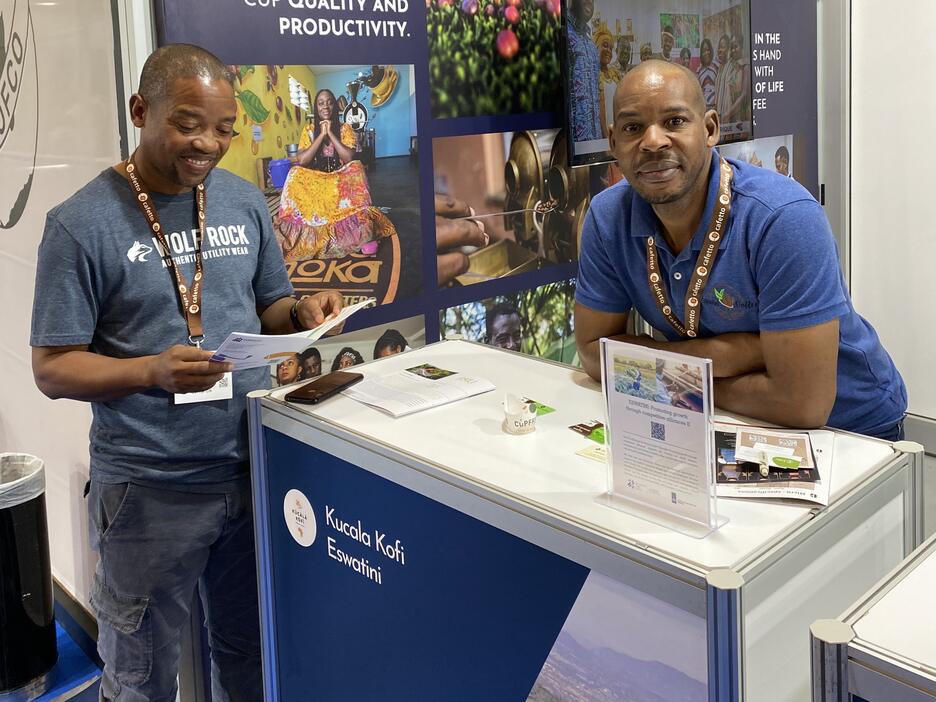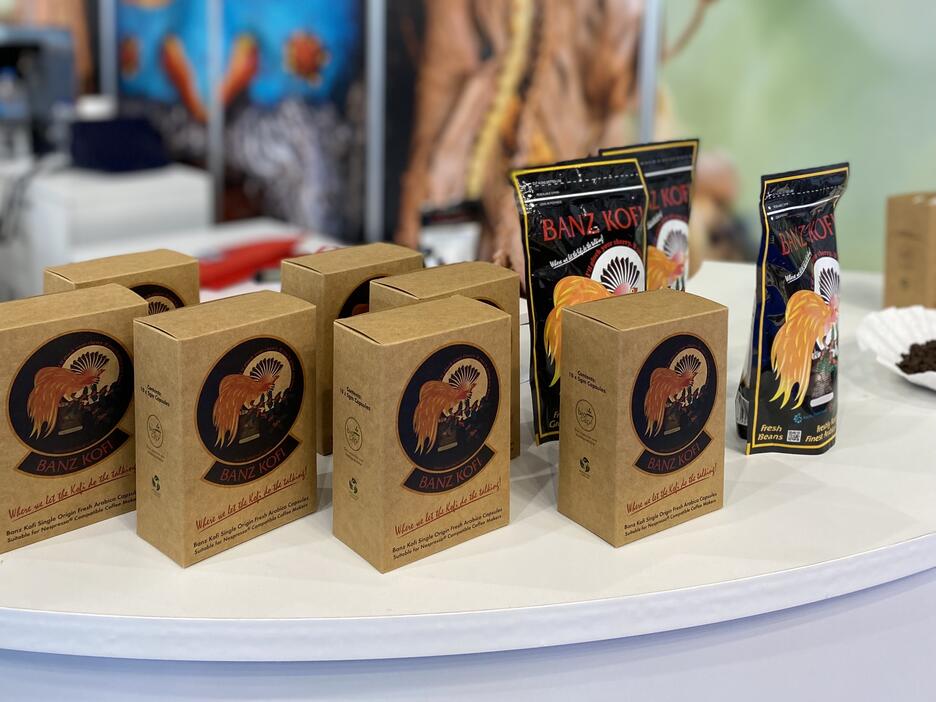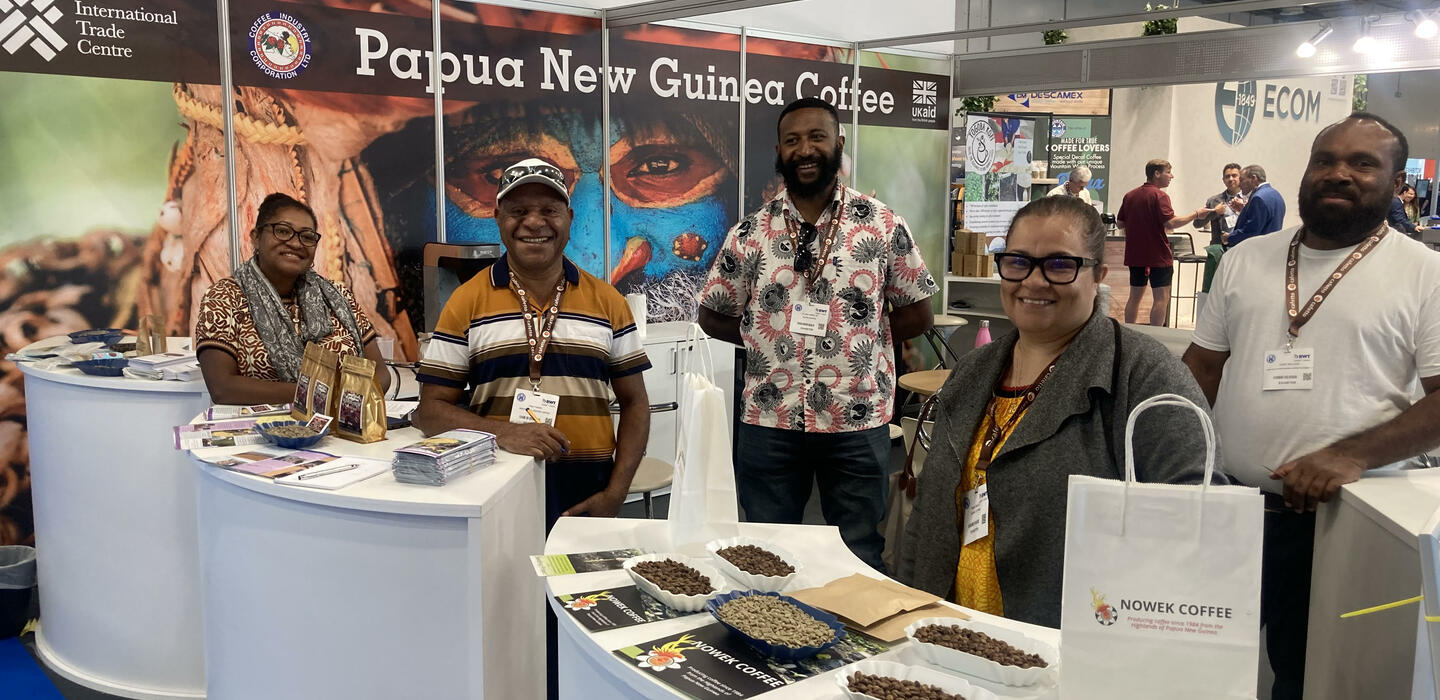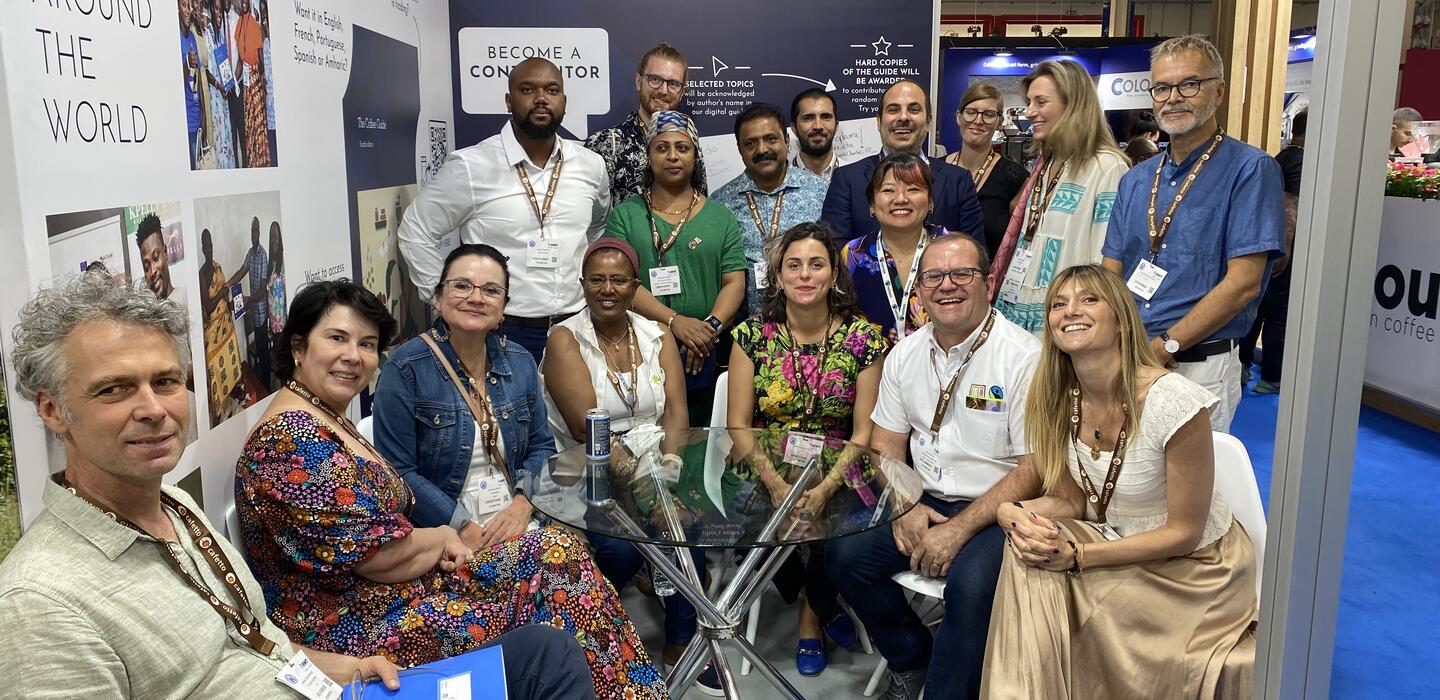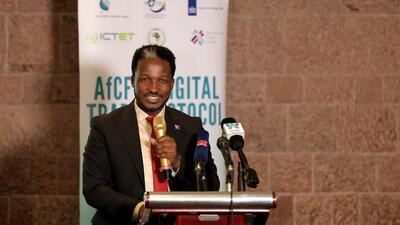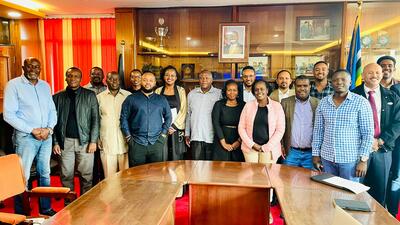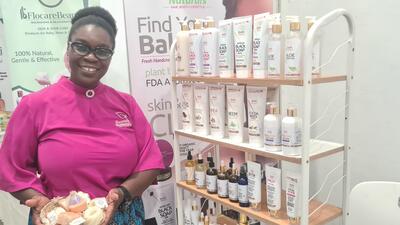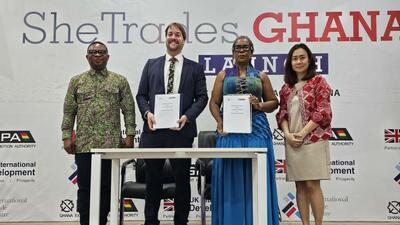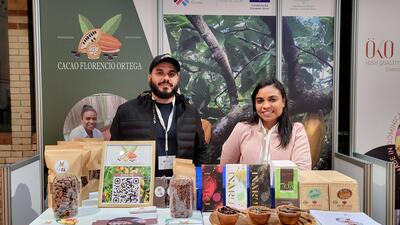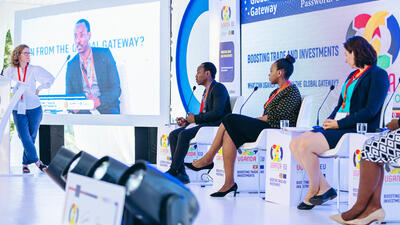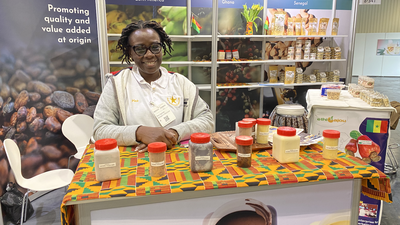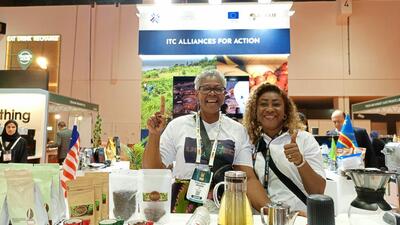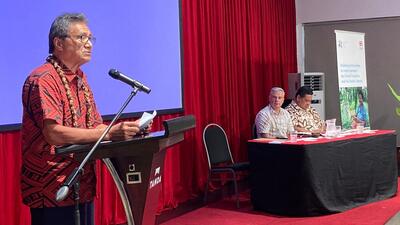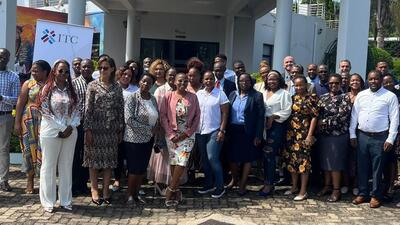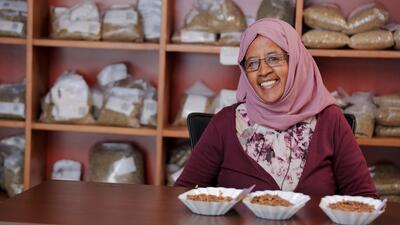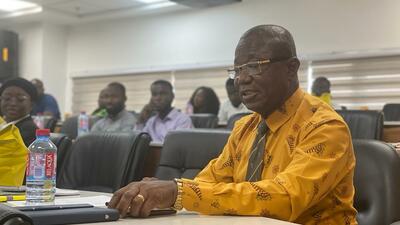
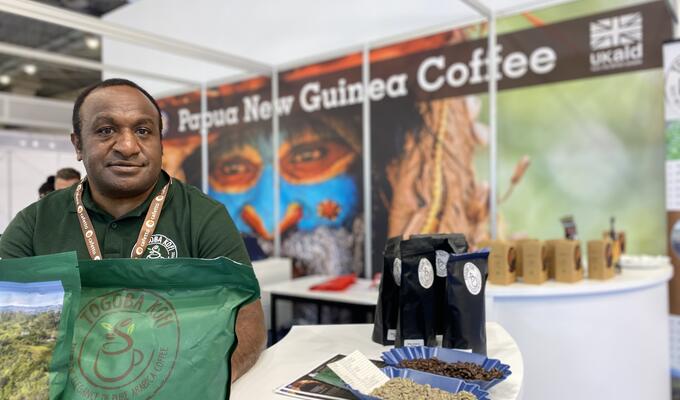
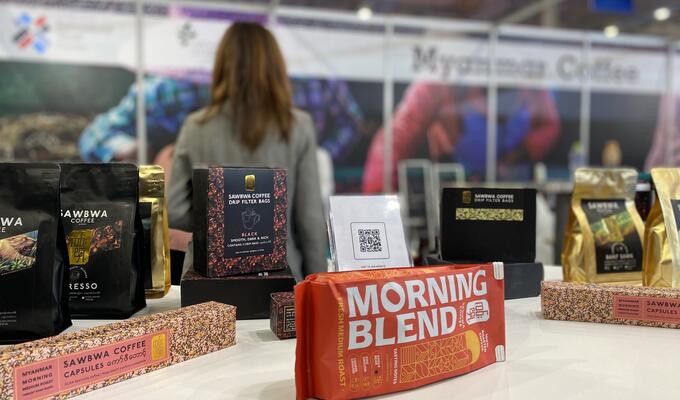
ITC brings smallholder producers to World of Coffee in Athens
ITC went to Greece for World of Coffee, one of the biggest annual global coffee events. Smallholder coffee producers took a global stage and found new markets.
This year’s World of Coffee in Athens, Greece, brought together an enthusiastic crowd of coffee professionals from all corners of this complex, multifaceted industry.
Over three intense days, traders, roasters, baristas, producers and their representatives, equipment makers and other industry professionals came face to face to network, do business, showcase innovations, and exchange perspectives. More than 10,000 people from 140 countries converged on Athens from 22 to 24 June.
This year, the 2023 World Barista Champion crowned at the trade show was Boram Um, representing Brazil. He is the fourth winner from a coffee-producing country in the last 20 years. This win is symbolic of a wider, gradual shift towards the industry becoming more inclusive of coffee actors from producer countries.
As the industry becomes more aware of its duty to represent producers and their interests more prominently, events like World of Coffee become more interesting to coffee producers.

ITC attended with smallholder coffee producers from across six countries and programmes, including Eswatini, Ethiopia, Ghana, Lao People's Democratic Republic, Myanmar and Papua New Guinea.
Through its partnership with CLAC-Fairtrade and Fairtrade Africa, Fairtrade-certified producers attended from Colombia, Peru, Brazil, Guatemala, Costa Rica, Nicaragua, Honduras and Ethiopia.
Producers share their origins at the cupping table
Many attendees noted that fine robusta coffee has finally found its place at the cupping table.
‘This is the first year that we were able to present fine robustas in our cupping sessions, and the result was fantastic – people’s palates are finally opening up to it as a specialty option,’ said Cecilia Sanada, a globally recognized coffee expert known as a Q grader and a coffee consultant for ITC.
At the ITC Alliances for Action booth, Cecilia brewed fine robusta coffee from Asili Coffee in Ghana, specialty arabica from Limu Inara Farmers’ Cooperative in Ethiopia, and samples from Eswatini’s budding coffee enterprise, Kucala Coffee. These producers are supported under the ACP Business-Friendly, Netherlands Trust Fund V Ethiopia and Alliances in Eswatini programmes and their donors.
Over at the ARISE+ stand, an ITC programme funded by the European Union, Lao and Myanmar coffee producers presented their wide ranges. At World of Coffee, you get the chance to test coffees and ‘cup your way around the world’. This year, Lao and Myanmar coffees were presented in the cupping rooms, demonstrating their high quality and unique flavour profiles to international coffee professionals.
Meanwhile, the UK Trade Partnerships Programme at ITC had a stand that showcased sustainable coffees from the highlands of Papua New Guinea. The coffee beans’ unique flavour profiles attracted a lot of interest. In addition to networking with potential buyers, the producers met complementary business which could offer improved packaging and better machinery. Sarah Jean Shelly, from Nowek Coffee, said after seeing first-hand the different roasting machinery in action, she was now considering roasting in PNG to produce a higher value product.
The trade show was also an opportunity to showcase ITC Coffee Guide, and to gather feedback and insights to inform its upcoming digital format, which will present regularly updated data and information on all chapter themes, as well as on new trends and topics.
The Coffee Guide showcased all five of its language editions, representing what’s spoken in major producer countries. These translations are much appreciated by industry actors from coffee producing countries.
‘ITC’s Coffee Guide is the most practical, hands-on coffee manual out there. I used it to learn about the business, and I hand it as a reference book to any employee starting out with us,’ said Alejandro Cadena, co-founder and CEO of Caravela Coffee. That sentiment was widely echoed by other trade show participants.
The show wrapped up with exhausted but energized exhibitors. ITC’s participating producers return inspired and with plans to upscale operations, and the Coffee Guide prepares for new digital products that will help inform the coffee sector more inclusively.
About the projects
The ACP Business-Friendly programme is funded by the European Union and the Organisation of African, Caribbean and Pacific States (OACPS) and jointly implemented by ITC’s Alliances for Action, the World Bank and UNIDO. It seeks to improve the ability of agribusiness firms in ACP countries to compete, grow and prosper in domestic, regional and international markets. Through the Alliances for Action approach, it promotes inclusive and sustainable agricultural value chains that value all stakeholders from farm to shelf.
The Netherlands Trust Fund V (NTF) (July 2021 – June 2025) is based on a partnership between the Ministry of Foreign Affairs of The Netherlands and the International Trade Centre. The programme supports MSMEs in the digital technologies and agribusiness sectors. Its ambition is two-fold: to contribute to an inclusive and sustainable transformation of food systems, partially through digital solutions, and drive the internationalisation of tech start-ups and export of IT&BPO companies in selected Sub-Saharan African countries.
The 'Eswatini: Promoting growth through competitive alliances II', funded by the EU, supports job creation for small farmers, entrepreneurs and artisans. Eswatini offers the global market unique organic produce, artisan roasted coffee, handmade cultural creations and gourmet condiment lines. ITC works closely with smallholder farmers, agro-processors and artisans in Eswatini to support them in ways that are sustainable and benefit both people and the planet. In this way, ITC fosters and preserves cultural heritage, and draws on artisan skills and concepts of green growth.
The ARISE Plus Laos programme is a four-year programme that contributes to the integration of the Lao economy into global production chains through targeted support to both the public and private sectors, with a focus on smallholders and SMEs. It concerns specifically targeted sectors (e.g. wood processing and agro-based products).
The ARISE Plus Myanmar Trade-Related Assistance Project aims to contribute to inclusive and sustainable growth. It supports greater connectivity and economic integration between Myanmar and the Association of Southeast Asian Nations (ASEAN) in line with the ASEAN Economic Community (AEC) Blueprint 2025. The project contributes to trade diversification and integration, regionally and internationally with a focus on market-led value chains.
The United Kingdom Trade Partnerships (UKTP) Programme, funded by the Foreign, Commonwealth & Development Office (FCDO) of the United Kingdom of Great Britain and Northern Ireland, aims to increase trade from developing countries to the United Kingdom (UK) and the European Union (EU) by maximizing the benefits of UK and EU Economic Partnership Agreements (EPAs) and the UK's Developing Countries Trading Scheme (DCTS). The UKTP Programme works in partnership with government agencies, private sector organisations, public sector institutions, small and medium-sized enterprises and other local stakeholders.




